Extramarks is an online learning platform offering tutoring and test-prep for school students. It provides video lessons, practice tests, and AI-powered tools for K–12 and competitive exams. The goal of this article is to give students and parents a clear, detailed comparison of Extramarks’ features, reviews, pricing, and alternatives so they can choose the best online tutoring service.
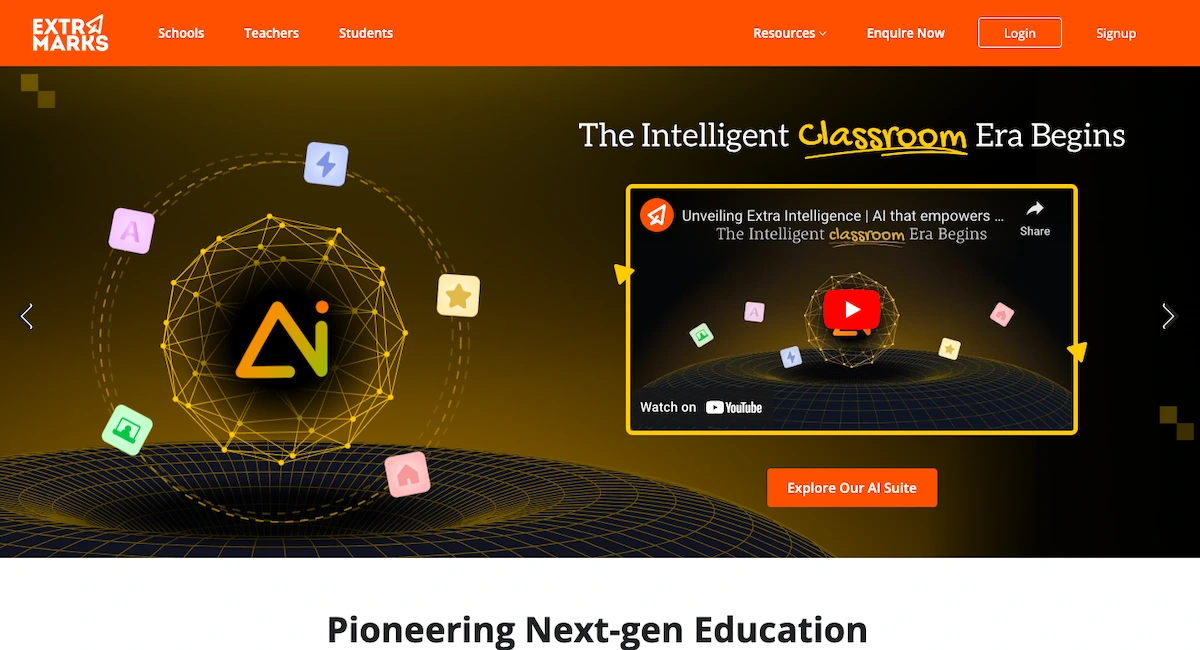
Extramarks Reviews and Testimonials
Google Play (Extramarks – The Learning App)
The Extramarks learning app has a high rating on Google Play: about 127K reviews with a 4.7 out of 5-star average. Users frequently praise the app’s rich content and easy interface. For example, one user said the app “improves learning” with clear explanation videos covering all subjects. Students also mention useful features like adaptive tests, worksheets, and progress tracking. On the negative side, some users report occasional glitches or missing content; one reviewer noted after-sales support was unhelpful when a recorded lecture was missing. Overall, the Learning App reviews highlight very strong content and usability, with only occasional technical issues.
However, a deeper look reveals a sharp contrast between official app stores and independent review sites. The chart below highlights this significant discrepancy in user satisfaction.
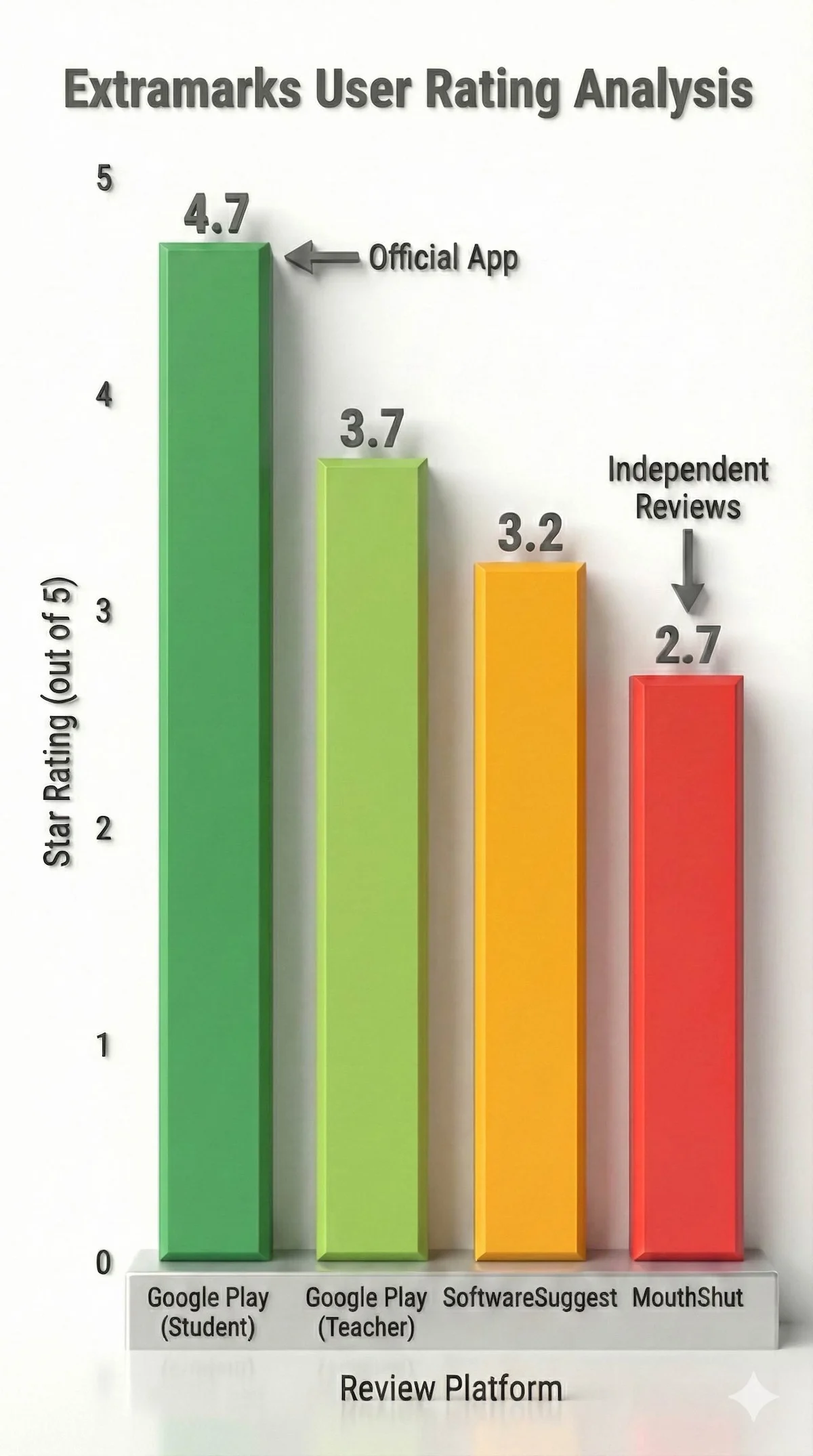
While the app interface is highly rated, independent reviews on MouthShut reveal significant service concerns.
This data suggests that while the app interface is polished, users often face challenges with post-purchase support that aren’t reflected in the Play Store ratings.
Google Play (Extramarks – Teaching App)
The Extramarks teaching app (for instructors) has around 1.23K reviews and a 3.7/5 rating. Teachers report it is generally easy to use and helpful. For instance, one teacher said, “I like the question bank and level of questions are good” Another praised automated grading and tools for monitoring student performance. Positive comments note that Extramarks provides good content and responsive support (one user said problems were “resolved nicely”). The main negatives are rare usability complaints (none severe shown). In short, tutors find the app useful for teaching content, though its 3.7 rating suggests room for improvement.
SoftwareSuggest
SoftwareSuggest lists Extramarks with a 3.2/5 average rating from 5 reviewers. The reviews highlight key points: many praise the AI-enabled “live bot” (for doubt solving) and the simple user interface. They also like that the curriculum covers lots of topics. On the downside, some reviewers report issues like difficulty accessing content if the internet is slow or offline. One review warned about unclear sales pitches and that promised mentorship was not always delivered. In general, SoftwareSuggest feedback notes innovative AI tools and thorough lessons, but some concerns about content access and support quality.
MouthShut
MouthShut user reviews are generally more critical. Extramarks has thousands of ratings there (about 9,488) averaging around 2.7 out of 5. Only about 56% of reviewers recommend it. The 5-star reviews (65% of ratings) suggest some users are very happy, but a significant 16% gave 1 star. Common complaints include confusing class schedules and refund problems (some reports say classes were canceled without notice). Others mention that the promised mentor support was not delivered. Positive MouthShut comments note that the content and app interface can be helpful when it works. In summary, MouthShut feedback is mixed — many love the content but many others report service and support issues.
Is Extramarks legit? Based on these reviews, Extramarks appears to be a real and functioning education platform, but user experiences vary. Its learning app’s 4.7-star rating and positive comments on content support that it delivers valuable materials. However, multiple reviews also mention support or technical issues. Thus, Extramarks is a legitimate company, but prospective users should be aware of mixed feedback on customer service and refunds.
In summary, Extramarks gets very good marks for its content quality and app features, especially in its student app. Many learners praise the comprehensive lessons and AI tools. On the flip side, concerns include app glitches, strict refund/cancellation policies, and uneven customer support. The overall picture is of a useful platform with strong curriculum content but some reliability and service caveats.
Extramarks Pricing
Pricing Range
Extramarks uses subscription packages. For example, one source notes K–12 plans starting at around INR 1820 per month for a 6-month plan (about US$22/month) and INR 3640 for a 9-month plan (~US$44/month). Foundations courses (e.g. exam prep) cost roughly INR 6000–7000 per month (~US$73–85) for 6–9 month packages. Longer courses (1–9 months) range about INR 7000–8800 per month (~US$85–110). These prices vary by region and course. Extramarks’s official pricing can be seen on their site or info pages.
To help you budget, we’ve broken down the estimated costs by category. Notice the significant price jump when moving from standard K-12 tuition to competitive exam preparation.
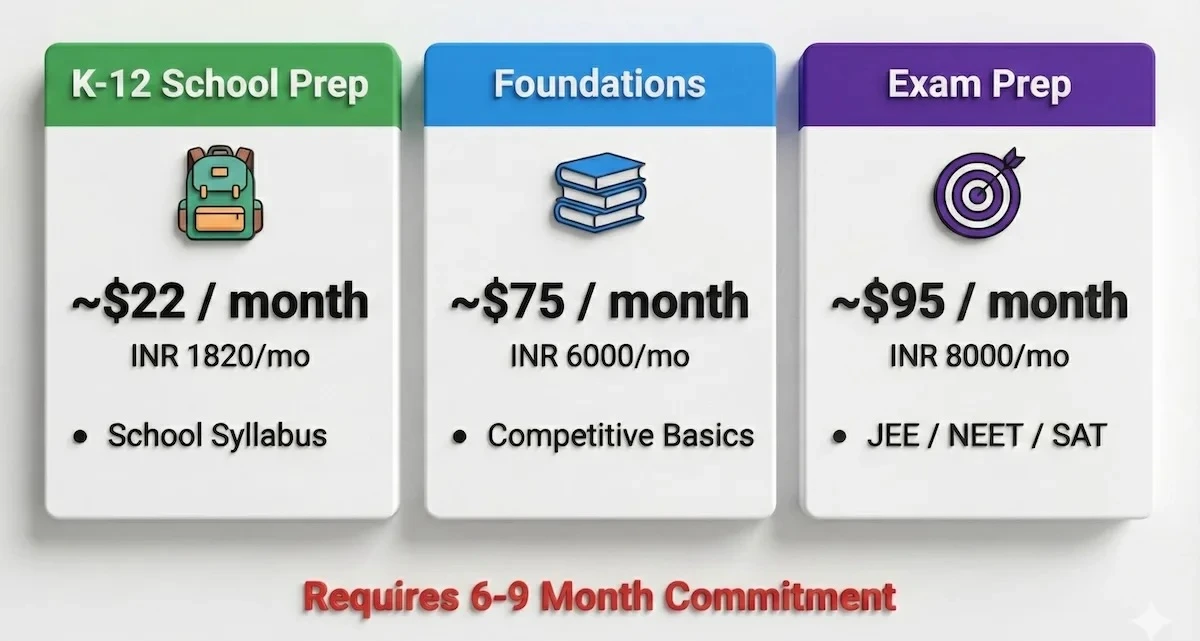
Extramarks pricing jumps significantly for competitive exam courses compared to standard K-12 tuition.
To help you budget, we’ve broken down the estimated costs by category. Notice the significant price jump when moving from standard K-12 tuition to competitive exam preparation.
What students say about Extramarks Pricing
There are few direct user comments on price. Comparing to similar services, Extramarks’s subscription (roughly US$20–40/mo) is low compared to typical one-on-one tutoring (often $30–60/hr). Chegg Study costs ~$16/mo, so Extramarks is in the same ballpark for unlimited access, and much cheaper than private tutoring. On forums, Indian users sometimes feel the fee is high given their local income levels. Overall, students generally treat Extramarks as a flat-rate subscription; many view it as a cost-effective way to cover a lot of material versus paying per session.
Hidden costs
Extramarks advertises no signup or technology fee. However, the FAQ reveals a ₹1000 (about US$12) cancellation fee per class. There are no known registration or processing fees beyond the subscription itself. The company does mention a ₹100 bonus for new accounts, and discounts if multiple packages are bought, but no surprise extras. In short, aside from the refundable fee, most costs are upfront subscription charges.
How Extramarks’s pricing works
Payment is upfront for a chosen package. Subscriptions activate immediately and run continuously, with no pay-later option. Extramarks accepts credit cards and also allows installment payment plans. You can combine multiple packages for a discount. There are no special low-income or foreign-student discounts listed. A promotional ₹100 bonus is sometimes given at sign-up. Overall, you purchase a block of months at once and pay up front for that access.
Free Trial
Yes – Extramarks offers a limited trial. The platform provides a 7-day free trial period on its learning app. For example, one page notes “you can use Extramarks for free just for seven days” before needing to subscribe. (Extramarks’s school programs also mention a 7-day trial.) After the trial ends, the user must pay to continue. Always check the latest terms on their site, but currently 7 days is the trial length.
Refund policy
Extramarks’s refund rules are strict. According to their FAQ, you can only request a refund within 7 days of activation. After that, no cancellations are allowed. The FAQ also imposes a ₹1000 fee per class on cancellation. In practice, customers report that refunds are hard to obtain once the trial ends. Several users on forums say they were not refunded even after cancelling in the allowed window. In summary, Extramarks’s official policy offers a short window for refunds, but many users find the process difficult and do not receive money back as expected. Be aware that the money-back guarantee is very limited.
Extramarks Alternatives
Students might look for Extramarks alternatives if they need different features (like live 1:1 tutoring or different subjects). Below are some popular alternatives, including MyEngineeringBuddy, with their relative pros and cons.
With so many options available, choosing the right type of support is crucial. This comparison table gives you a quick snapshot of how Extramarks stacks up against major competitors like Chegg and Wyzant.
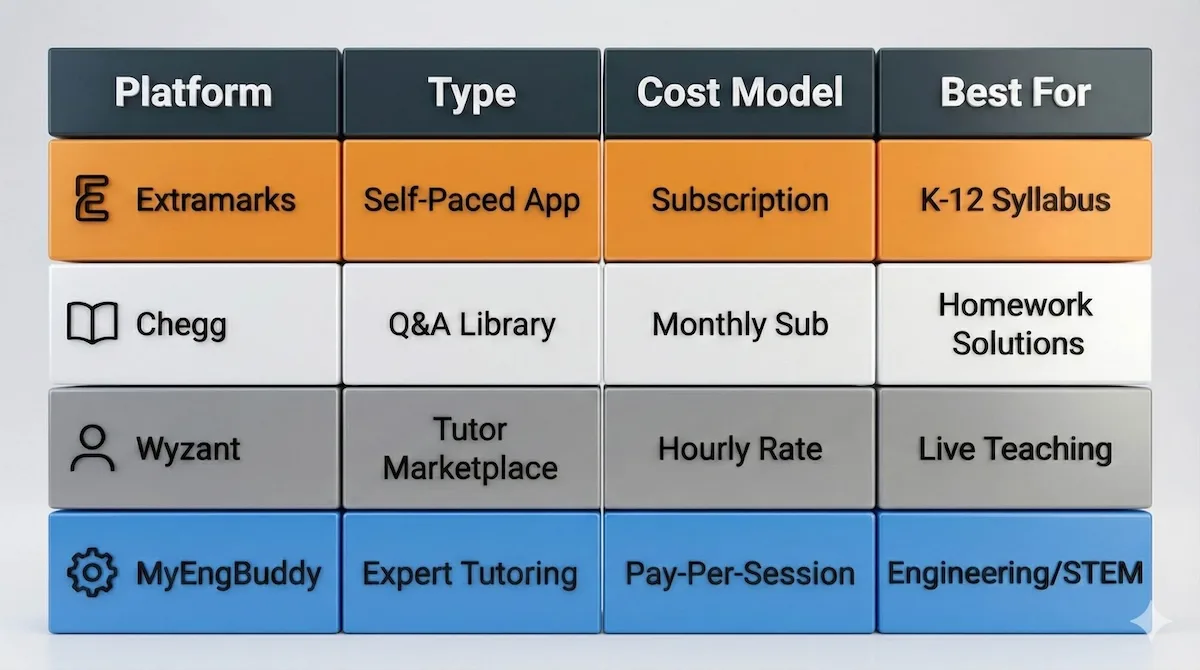
Choose the right platform model: Subscription apps like Extramarks vs. on-demand expert tutoring.
As you can see, the main difference lies in the delivery model—whether you want a self-paced app subscription or live, on-demand human interaction.
Chegg

Chegg is a Q&A and study platform with an extensive solutions library. Pros: Huge collection of textbook solutions and expert answers available 24/7. It offers on-demand help and guided answers, so students get quick responses. Cons: It is subscription-only (about $16/mo) and has a limit on questions per month. Some students report that not all answers are accurate. Compared to Extramarks, does not provide full structured courses or live sessions – it is more a self-serve solution database. Pricing is monthly vs Extramarks’s term plans; Chegg can be cheaper if only occasional help is needed. Overall, Chegg’s strength is its huge Q&A and solution bank, but it lacks personalized tutoring and curriculum alignment.
Wyzant
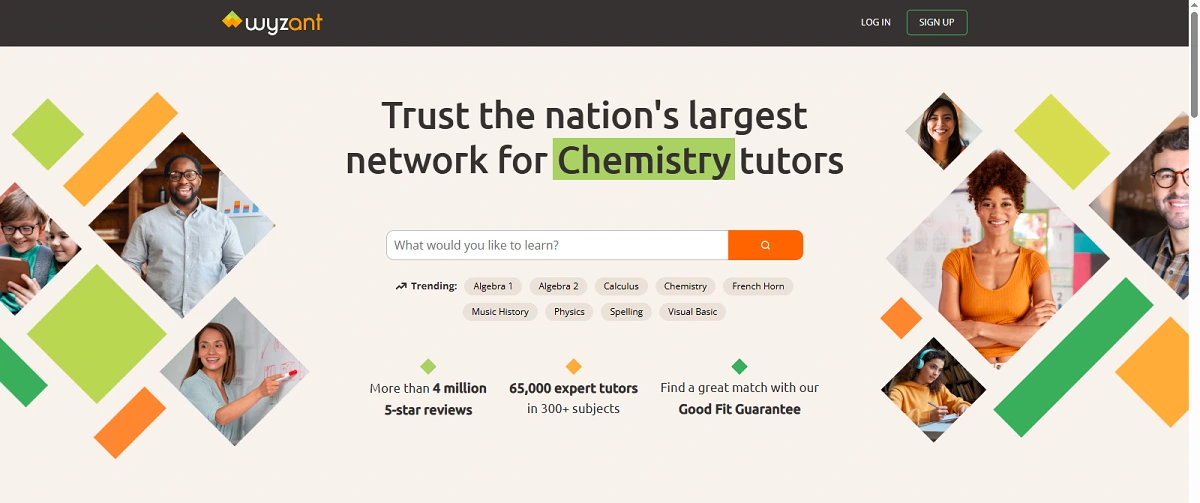
Wyzant is a freelance tutoring marketplace. Pros: Thousands of tutors in many subjects, including advanced math and engineering. You can pick a tutor by background and rate. Cons: Very expensive (tutors set their own rates, typically $35–$60/hr) and pay-per-session. Wyzant lets you schedule one-on-one tutoring sessions at your pace. Compared to Extramarks’s app-based content, Wyzant offers live interactive teaching. However, you must hire a tutor and pay hourly, so costs can be much higher. Extramarks has structured curriculum at fixed pricing, whereas Wyzant is pay-as-you-go with more tutoring flexibility but at higher cost.
Tutor.com

Tutor.com provides on-demand tutoring. Pros: 24/7 access to tutors in many subjects, good for homework help anytime. Cons: Also costly; it charges about $0.75 per minute (about $45/hr) or monthly packages (e.g. ~$40 for 1 hour). You can just pay for what you need. Unlike Extramarks’s pre-recorded lessons, Tutor.com has live chat or video sessions. This means immediate help but at a higher price per hour. Extramarks wins on price (for broad content), while Tutor.com wins on scheduling flexibility and availability. Tutor.com does not offer courses or videos, just tutoring time, which may suit different needs.
Course Hero
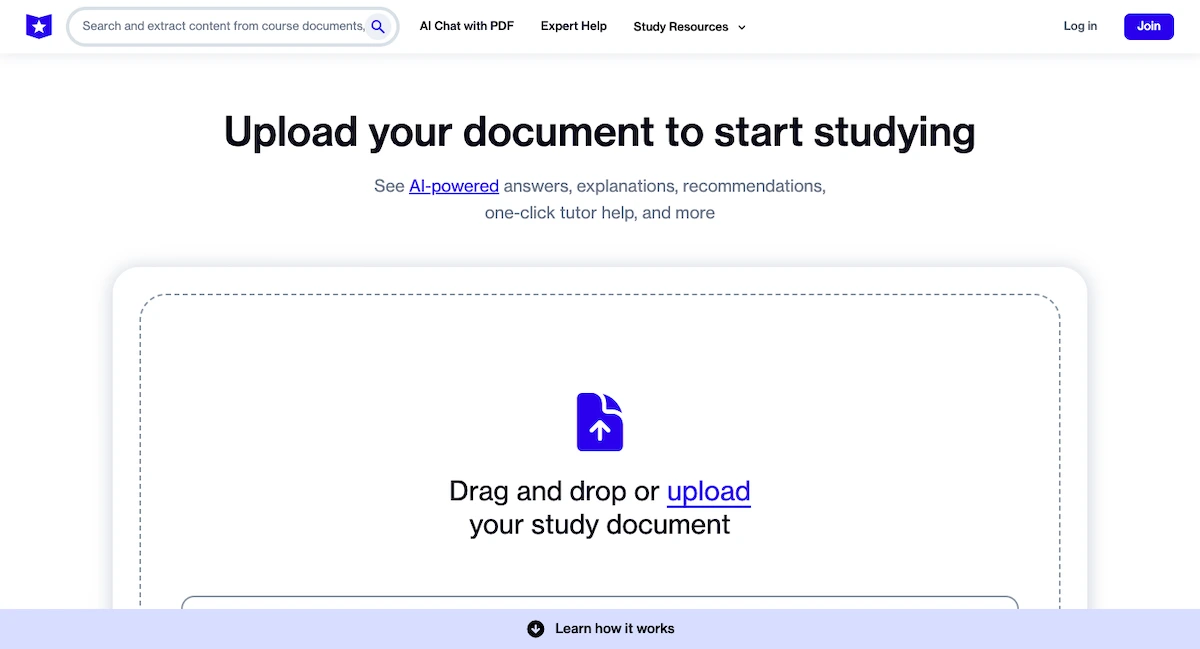
Course Hero is a subscription-based study resource. Pros: Large library of user-uploaded notes, textbook solutions, and practice problems. It covers many subjects and offers tutor Q&A as well. Cons: It’s relatively pricey (around $40/month) and content quality is variable since much is crowd-sourced. Like Chegg, it is self-service (no live classes). Compared to Extramarks, Course Hero provides lots of document resources but lacks the interactive learning structure. Extramarks’s advantage is its guided curriculum and tools, whereas Course Hero excels at document sharing and occasional tutor answers (but at higher cost and with limited free access). Course Hero can be good for reference, but it doesn’t replace an interactive tutoring platform.
My Engineering Buddy
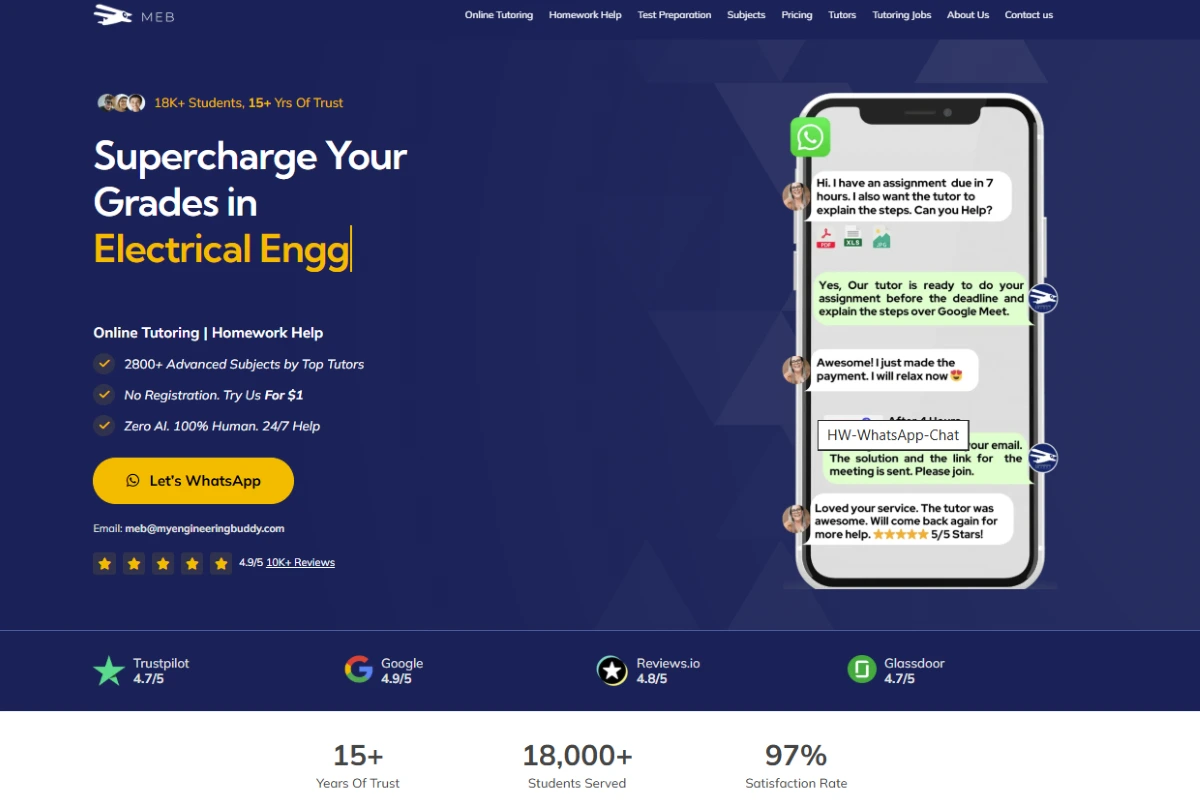
My Engineering Buddy is an on-demand tutoring platform focused on STEM. Pros: Highly specialized for engineering and advanced math/science. Tutors are typically college-educated in technical fields, and sessions are one-on-one. Pricing is per-session (often moderate rates around $15–30/hr) with a free trial lesson. It offers 24/7 availability and personalized matching. Cons: Limited to STEM and homework help – not full school curriculum. Compared to Extramarks’s pre-made courses, MEB provides live tutoring, which is ideal for difficult college topics. Many users say MEB tutors are patient and knowledgeable. In summary, MEB’s strength is expert, flexible tutoring for complex subjects, whereas Extramarks’s strength is broad curriculum content. MEB is a strong choice for college-level assistance.
How it Works?
For Students
To use Extramarks, students first sign up on the website or learning app, providing details like grade and subjects needed. They then pick a subscription package (e.g. K–12 or test prep) and pay upfront. Once enrolled, students access video lessons, quizzes, and interactive modules at any time. For help, Extramarks has a built-in “study bot” (AI chat) called Alex, as well as periodic live classes for certain courses.
The sign-up process is rigid compared to pay-as-you-go services. The flowchart below outlines the typical student journey, highlighting the critical payment step.
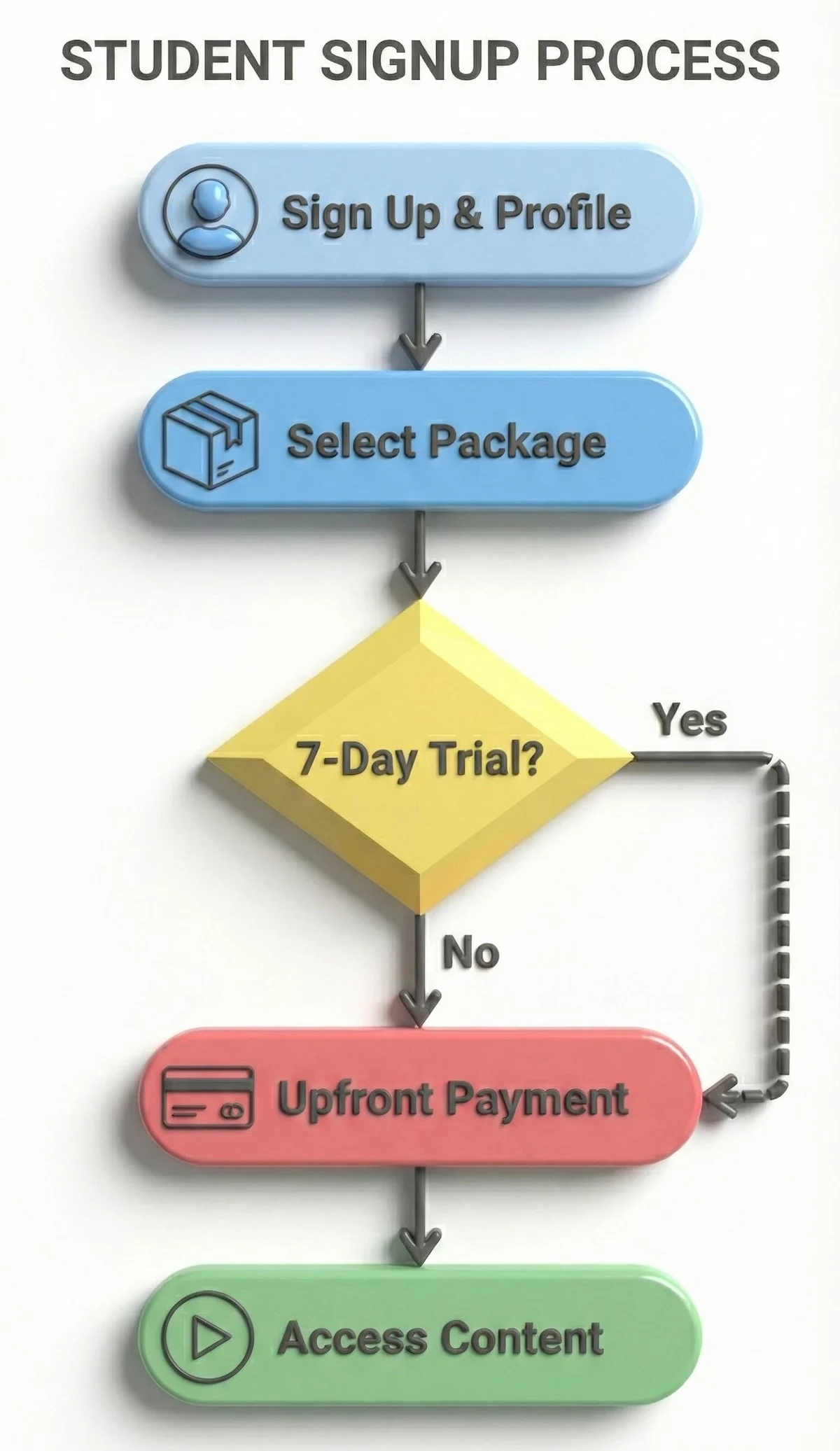
Unlike pay-as-you-go services, Extramarks requires upfront payment for long-term access after the trial.
The key takeaway here is the transition from the 7-day trial to the locked-in subscription—make sure you are fully satisfied before that trial week expires.
The platform does not match you with a personal tutor; instead, help comes from scheduled classes and automated tools. Sessions (lessons) can be watched on demand, and live classes (when available) are scheduled by Extramarks. Overall, students learn through the app’s content library and automated support rather than one-on-one sessions.
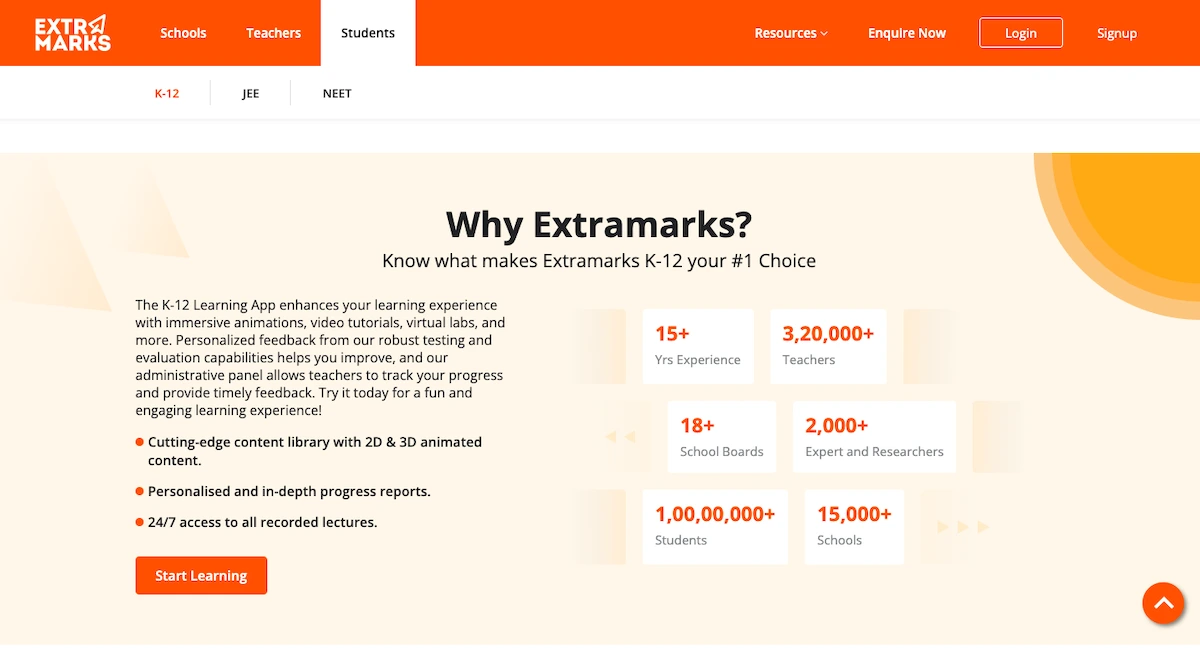
For Tutors
Extramarks does not have an open tutor signup like a marketplace. Instead, it hires qualified teachers as employees. To become a tutor or content expert, one would apply through the company’s careers page. The Extramarks Careers site invites educators and technologists to join the team. Prospective tutors need strong academic background and teaching skills, then go through the formal hiring process (they do not simply register online like freelance platforms). Successful candidates become staff who help create or deliver content on the platform. If you are interested, check Extramarks’ official Careers page for openings here . Extramarks provides training and resources to its tutors as part of the job.
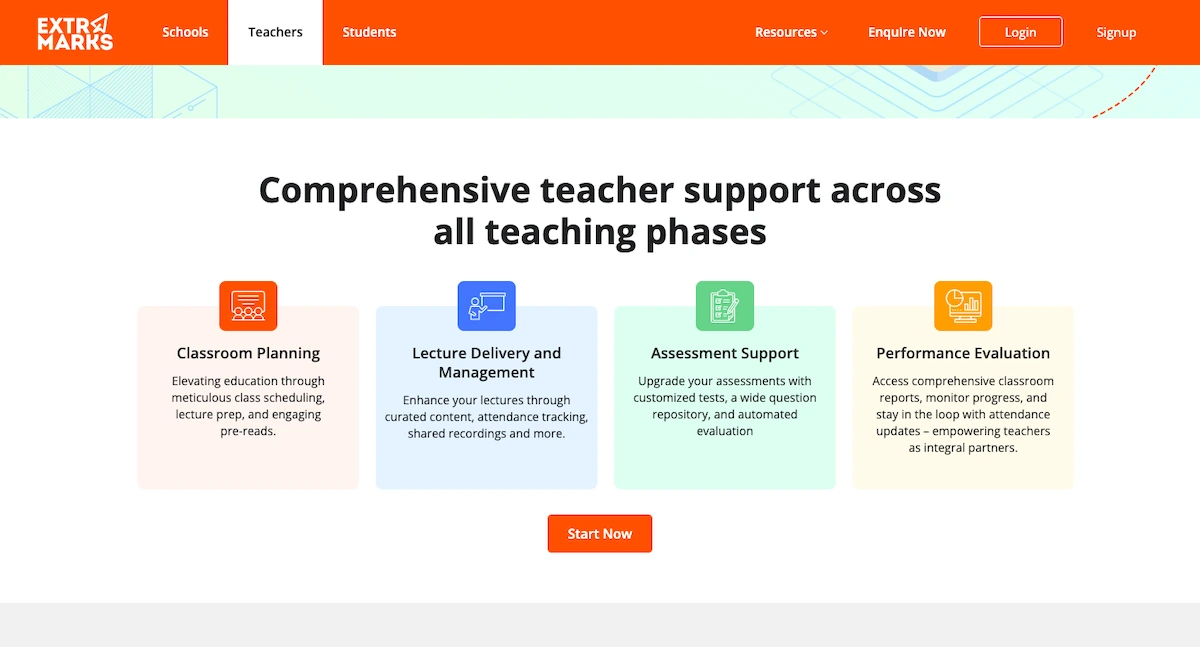
Extramarks: Company Information
Extramarks was founded in 2007 by a team of education and tech professionals. Its mission is to use cutting-edge technology (like AI) to improve learning. The company’s tagline is “Pioneering next-gen education with AI-based solutions”, reflecting its goal to personalize and modernize teaching. The vision is to provide accessible, high-quality digital learning for students worldwide.
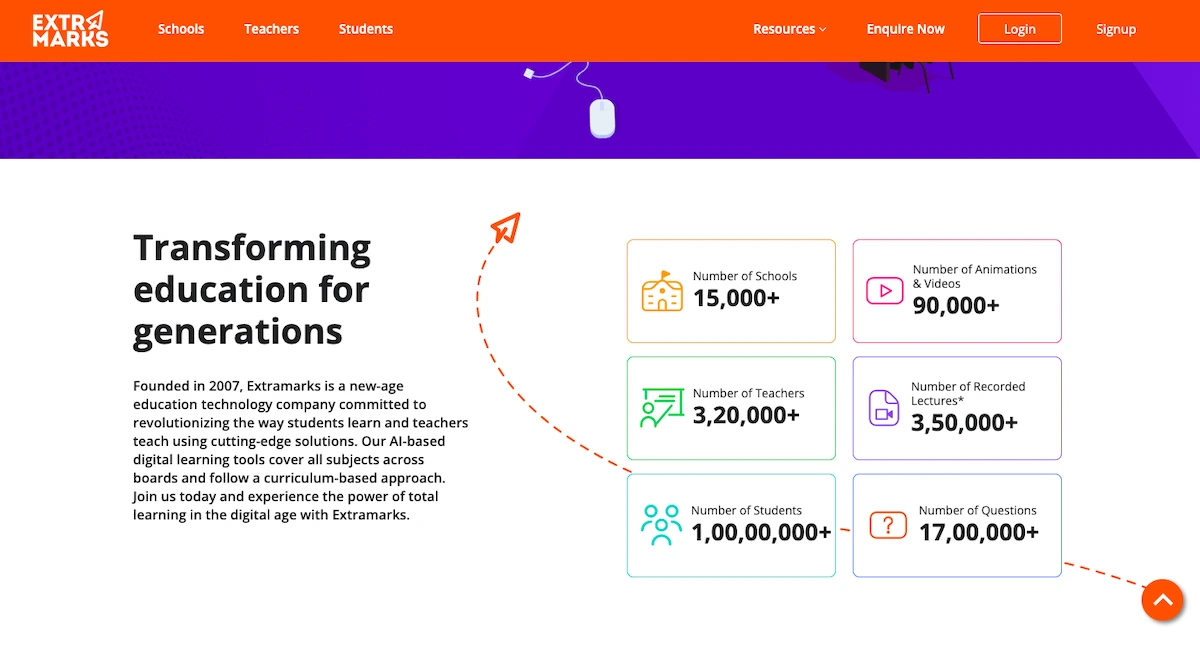
Extramarks is headquartered in India (with operations globally). It has thousands of employees (Glassdoor notes ~3,500 staff) and claims to serve millions of students (the Apple app page notes 10M+ users). It partners with many schools (the app cites 15K+ schools using the platform). While it started in Asia, it also markets to students in the Middle East and beyond.
Services: Extramarks offers live and recorded video lessons, homework help, adaptive tests, and interactive quizzes. It has a school-focused package (smart classes, teacher apps) and a direct-to-student app. Subjects offered include the core K–12 syllabus (math, science, English, etc.) plus major test prep (engineering, medical entrance, and standardized tests). For example, the app provides JEE, NEET, SAT, and TOEFL courses. Unique features include AI tutors and personalized content generation, weekly gamified quizzes, and doubt-solving sessions with a study bot.
It can be hard to visualize how all these features work together. Here is a visual breakdown of the Extramarks ‘Learning Ecosystem’ showing how the AI bot, video lessons, and live classes interconnect.
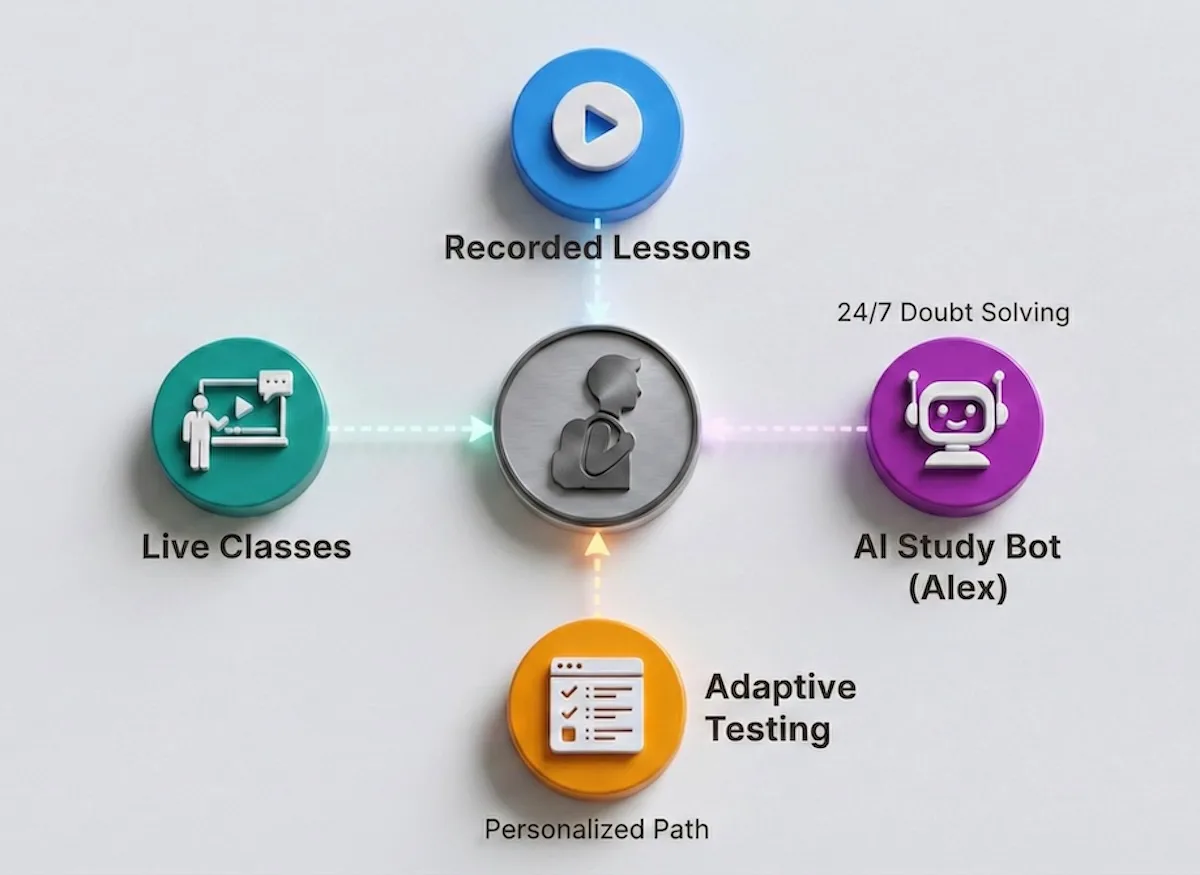
The Extramarks ecosystem combines recorded content with AI tools like ‘Alex’ to personalize the study schedule.
By integrating these elements, the platform aims to create a self-sustaining loop where testing informs future lesson recommendations.
USP of Extramarks
- Large scale curriculum platform: Trusted by 15,000+ schools and millions of students with comprehensive K–12 and exam-prep content.
- AI-powered personalization: Advanced AI tools (like an AI study bot and auto-content generation) tailor learning paths and automate doubt-solving.
- Fully integrated content: Offers extensive video lessons, quizzes, and NCERT solutions aligned to major school boards and competitive exams.
Drawbacks of Extramarks
- Strict refund policy: Cancellation/returns are limited (refunds only within 7 days) and a ₹1000 fee per cancelled class, leading to customer complaints.
- Internet-dependent learning: Requires continuous online access; lack of offline mode is a common complaint.
- Limited personalization: No one-on-one tutor matching; users rely on in-app tools and scheduled classes only.
- Restricted curriculum: Focuses on K–12 and certain exam prep (CBSE/ICSE style); not designed for advanced college courses.
- Mixed support quality: User reviews note slow customer service responses and technical glitches, which can hinder learning.
Comparison with My Engineering Buddy
Compared to Extramarks, My Engineering Buddy (MEB) specializes in advanced STEM tutoring. MEB connects students directly with tutors (often engineering or science graduates) for one-on-one help. MEB’s pricing is per-session, which can be more flexible for light users, whereas Extramarks is subscription-based. Many MEB users praise the highly qualified tutors and personalized attention. In contrast, Extramarks provides broad curriculum resources but less individual guidance. Students often choose MEB for college-level or complex problems (e.g., calculus, circuit analysis), while Extramarks suits structured school learning. In testimonials, MEB tutors are noted for in-depth explanations and quick responses, making it strong for homework help on tough topics.
Still undecided? Let’s look at a direct head-to-head comparison to see which learning style fits your specific needs: automated app learning or personalized expert tutoring.
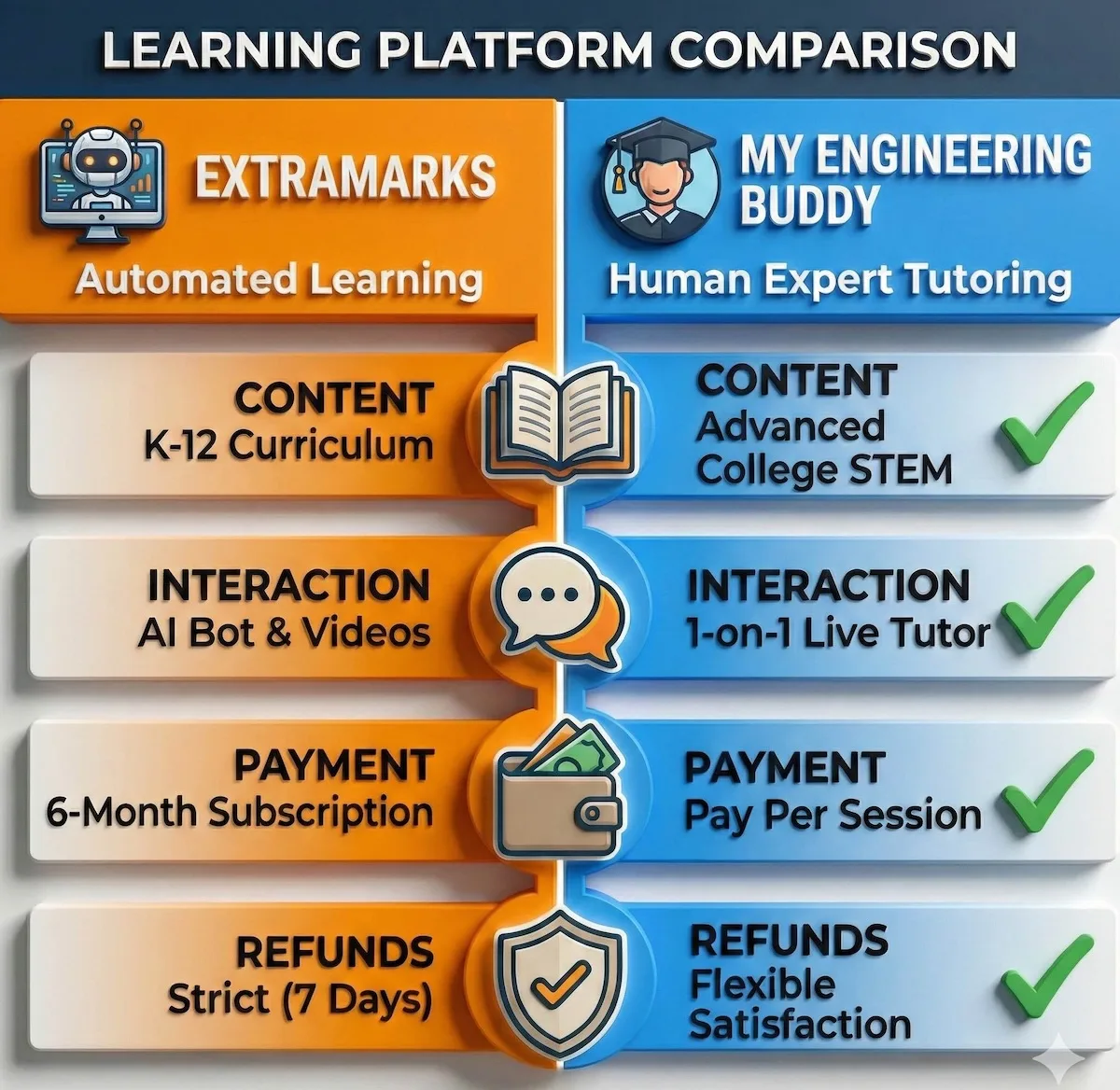
For complex engineering topics, live human interaction (MEB) often beats automated playlists (Extramarks).
If you are an engineering student struggling with complex concepts that an AI bot can’t explain, a human tutor is often the superior investment.
Customer Support and Policies
Extramarks provides support via phone and email. However, many users report slow responses or unresolved queries. Officially, the platform offers support during working hours, but not 24/7 live chat. The refund/guarantee policy is limited: only a 7-day refund window with conditions. In comparison, MyEngineeringBuddy advertises 24/7 availability and a clear refund/trial policy (e.g., a free trial lesson), which is generally more student-friendly.
Global Reach and Localization
Extramarks is primarily geared to students in Asia and the Middle East. Its content is in English (and some regional languages), aligned with international curricula. It does not offer broad multilingual support – it mainly targets English-speaking users. MyEngineeringBuddy is also global and English-focused, but it emphasizes a worldwide audience (including US/UK students). Both platforms work globally, but Extramarks’s materials are more curriculum-specific, while MEB is simply subject-specific and globally applicable.
Extramarks’s future plans
Extramarks is heavily investing in AI. In 2025 it launched “Extra Intelligence,” an AI suite for classrooms. This includes automated assessments, real-time engagement tracking, and a 24/7 AI “Co-Pilot” for students (answering doubts instantly). The company emphasizes that “the future of education lies in intelligent, responsive, and inclusive learning systems”. These moves show Extramarks is building more smart tools (e.g. AI-graded tests, adaptive learning paths). The aim is to scale personalized learning globally and keep innovating with technology.
FAQs About Extramarks
Q: How does Extramarks compare to My Engineering Buddy?
A: Extramarks offers structured courses and app-based learning mainly for K–12 and exam prep. My Engineering Buddy provides live 1:1 STEM tutoring on demand. Extramarks is subscription-driven with AI tools, while MEB has personal tutors and pay-per-session. For college-level or complex topics, MEB’s expert tutors are usually better; for broad school curricula, Extramarks’s app is convenient.
Q: Which curricula and exams does Extramarks cover?
A: It covers all major school boards (e.g. CBSE and ICSE) and exam-prep courses. The app specifically mentions K–12 subjects plus JEE and NEET preparation. It also includes standardized test prep for SAT/TOEFL, and provides NCERT solution sets, mock tests, and practice questions.
Q: Does Extramarks offer live classes?
A: Yes. The platform includes scheduled live online classes taught by instructors for grades 6–12. These interactive sessions allow for real-time doubt-clearing. Additionally, students have unlimited in-app doubt-solving via chat during classes.
Q: Is Extramarks available globally?
A: Extramarks primarily serves Asia and Middle East markets. It is available internationally but content is tailored to specific curricula, mainly in English. Non-Indian students can use it, but the courses follow the curricula noted above.
Q: What free trial or guarantee does Extramarks have?
A: It offers a 7-day free trial on the learning app. There is no longer-term money-back guarantee. After the trial, cancellations are only allowed within 7 days of purchase, with fees applied.
Q: How does Extramarks differ from other services (like tutoring platforms)?
A: Unlike on-demand tutor platforms, Extramarks focuses on pre-made curriculum content and automated help (via AI). Its pricing is flat (subscription) instead of pay-per-session. It’s an all-in-one learning system with quizzes, videos, and analytics built in. In contrast, pure tutoring sites match students to live tutors and charge hourly. Extramarks is more like a self-study app enriched with technology, whereas tutoring sites offer personal interaction.
Conclusion
Extramarks excels in comprehensive, AI-enhanced K–12 education content, making it a strong choice for school students preparing for standard curricula and exams. Its strengths include rich multimedia lessons and a proven learning method. However, weaknesses include limited one-on-one help, strict refund terms, and reported service issues. For highly advanced STEM help or flexible tutoring, MyEngineeringBuddy stands out as a great alternative, offering expert tutors on demand. Ultimately, Extramarks is solid for structured school learning, while MEB may better serve complex college-level or homework needs.
******************************
This article provides general educational guidance only. It is NOT official exam policy, professional academic advice, or guaranteed results. Always verify information with your school, official exam boards (College Board, Cambridge, IB), or qualified professionals before making decisions. Read Full Policies & Disclaimer , Contact Us To Report An Error
